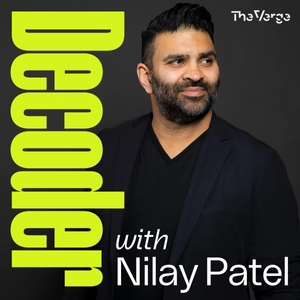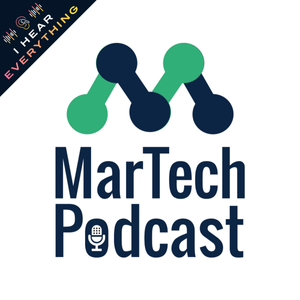
#14 - Michael Hasselberg: Generative AI is the future
09/08/23 • 27 min
In this episode, Dr. Hasselberg sits down for an in-depth conversation with Dr. Aaron Neinstein, chief medical officer at Notable. Among other things, the two discuss:
The power of advanced AI and LLMs to dramatically reduce development time
How pre-trained models are being used to power automated form fillers
The drivers and motivations of being an early adopter
And much more.
—-
Dr. Michael Hasselberg is the first Chief Digital Health Officer at University of Rochester (UR) Medicine and is the co-Director of the UR Health Lab, the health system’s digital health incubator. He is also an Associate Professor of Psychiatry, Clinical Nursing, and Data Science at the University of Rochester.
Board certified as a Psychiatric Mental Health Nurse Practitioner, Dr. Hasselberg completed his Ph.D. degree in Health Practice Research at the UR and a postdoctoral certificate in Healthcare Leadership at the Johnson School of Management at Cornell University.
His expertise expands health and technology as a Robert Wood Johnson Foundation Clinical Scholar Fellow and advisor on digital health modalities to the New York State Department of Health, the Department of Health & Human Services, and the National Quality Forum.
—-
Outline
Here are the timestamps for this episode.
(00:00) - Intro
(02:02) - Trying to solve complex healthcare problems before GPT-4
(03:41) - Solving the patient messaging problem with GPT-4 in just two days
(08:03) - Non-patient facing use cases for LLMs and generative AI
(09:22) - Building automated form fillers (workers comp)
(10:54) - Using LLMs to build tools for the IT Help Desk at a health system
(12:45) - Generative AI for ambient documentation
(14:45) - What’s the motivation to be an early adopter of technology?
(18:40) - Why banning the use of generative AI is not a winning strategy
(19:28) - Exploring the incentives for continued innovation
(23:22) - What guardrails does an innovation incubator operate within?
(27:45) - End
Relevant links
Dr. Michael Hasselberg on LinkedIn
Dr. Neinstein on LinkedIn and Twitter
Notable on LinkedIn
In this episode, Dr. Hasselberg sits down for an in-depth conversation with Dr. Aaron Neinstein, chief medical officer at Notable. Among other things, the two discuss:
The power of advanced AI and LLMs to dramatically reduce development time
How pre-trained models are being used to power automated form fillers
The drivers and motivations of being an early adopter
And much more.
—-
Dr. Michael Hasselberg is the first Chief Digital Health Officer at University of Rochester (UR) Medicine and is the co-Director of the UR Health Lab, the health system’s digital health incubator. He is also an Associate Professor of Psychiatry, Clinical Nursing, and Data Science at the University of Rochester.
Board certified as a Psychiatric Mental Health Nurse Practitioner, Dr. Hasselberg completed his Ph.D. degree in Health Practice Research at the UR and a postdoctoral certificate in Healthcare Leadership at the Johnson School of Management at Cornell University.
His expertise expands health and technology as a Robert Wood Johnson Foundation Clinical Scholar Fellow and advisor on digital health modalities to the New York State Department of Health, the Department of Health & Human Services, and the National Quality Forum.
—-
Outline
Here are the timestamps for this episode.
(00:00) - Intro
(02:02) - Trying to solve complex healthcare problems before GPT-4
(03:41) - Solving the patient messaging problem with GPT-4 in just two days
(08:03) - Non-patient facing use cases for LLMs and generative AI
(09:22) - Building automated form fillers (workers comp)
(10:54) - Using LLMs to build tools for the IT Help Desk at a health system
(12:45) - Generative AI for ambient documentation
(14:45) - What’s the motivation to be an early adopter of technology?
(18:40) - Why banning the use of generative AI is not a winning strategy
(19:28) - Exploring the incentives for continued innovation
(23:22) - What guardrails does an innovation incubator operate within?
(27:45) - End
Relevant links
Dr. Michael Hasselberg on LinkedIn
Dr. Neinstein on LinkedIn and Twitter
Notable on LinkedIn
Previous Episode

#13 - Ilana Golbin: Responsible AI and its application in healthcare
In this episode, Ilana sits down for an in-depth conversation with Dr. Aaron Neinstein, chief medical officer at Notable. Among other things, the two discuss:
What organizations look and function like when they are taking the right approach to responsible AI
How responsible AI is similar to the ‘rules of the road’ that keep us organized, safe, and able to get to where we want to go quickly when driving
Where healthcare organizations typically start with responsible AI
And much more.
—-
Ilana is Director and Responsible AI Lead at PwC US, where she serves as one of the leads for Artificial Intelligence. Ilana specializes in applying machine learning and simulation modeling to address client needs across sectors regarding strategic deployment of new services, operational efficiencies, geospatial analytics, explainability and bias.
Ilana is a Certified Ethical Emerging Technologist, is listed as one of 100 “Brilliant Women in AI Ethics” in 2020, and was recently recognized in Forbes as one of 15 leaders advancing Ethical AI. Since 2018, she has led PwC’s efforts globally in the development of cutting-edge approaches to build and deploy Responsible AI.
—-
Outline
Here are the timestamps for this episode.
(00:00) - Intro
(02:00) - Defining Responsible AI
(05:25) - Who typically ‘owns’ responsible AI within an organization?
(08:10) - Why responsible AI should fit within existing governance capabilities
(10:42) - The differences in responsible AI for builders vs. implementers
(13:33) - Who is doing responsible AI the right way? What are examples?
(16:30) - How a good governance program is like the rules of the road for driving
(19:10) - Where organizations have ‘gone wrong’ with responsible AI - common themes
(24:13) - Where healthcare executives should start with responsible AI
(29:04) - Exploring the common objections to advanced AI technologies
(30:26) - Recommended resources for learning more about responsible AI
(34:47) - End
Relevant links
Ilana Golbin on LinkedIn
Dr. Neinstein on LinkedIn and Twitter
NIST AI Risk Management Framework
Notable on LinkedIn
Next Episode

#15 - Eric Topol: Actualizing the opportunity with advanced AI
In this episode, Dr. Topol sits down for an in-depth conversation with Dr. Aaron Neinstein, chief medical officer at Notable. Among other things, the two discuss:
How AI can make healthcare human again
Patient autonomy and access to care
The medical community’s resistance to change
And much more.
—-
Eric Topol is the Founder and Director of the Scripps Research Translational Institute, Professor of Molecular Medicine, and Executive Vice-President of Scripps Research.
He has published over 1,200 peer-reviewed articles, with more than 320,000 citations, was elected to the National Academy of Medicine, and is one of the top 10 most cited researchers in medicine. His principal scientific focus has been on individualized medicine using genomic, digital, and A.I. tools.
He authored three bestseller books on the future of medicine: The Creative Destruction of Medicine, The Patient Will See You Now, and Deep Medicine: How Artificial Intelligence Can Make Healthcare Human Again. Topol is the principal investigator to two large NIH grants, the All of Us Research Program that supports precision medicine and a Clinical and Translational Science (CTSA) Award that promotes innovation in medicine. He was the founder of a new medical school at Cleveland Clinic (Lerner College of Medicine), was commissioned by the UK to lead a review of their National Health Service, and is active clinically as a cardiologist.
—-
OUTLINE
Here are the timestamps for this episode.
(00:00) - Intro
(01:26) - How AI can impact the doctor-patient relationship
(05:00) - What is the next book Dr. Topol will write that correctly predicts a future trend?
(06:07) - Why it took a pandemic to get telemedicine off the ground
(06:32) - Resistance to change in the medical community
(07:00) - How LLMs and advanced AI can change the mindset
(10:23) - Why the industry needs to seize the moment we are in
(12:01) - Exploring how to build trust in AI among the medical community
(14:30) - Which areas are seeing the most uptake in terms of AI in healthcare?
(16:28) - Keeping the doctor-patient relationship at the core as AI becomes more widely deployed
(18:45) - Tips for staying current on the latest trends and news
(21:43) - End
Relevant links
Eric Topol, MD on LinkedIn and Twitter
Dr. Neinstein on LinkedIn and Twitter
Notable on LinkedIn
If you like this episode you’ll love
Episode Comments
Generate a badge
Get a badge for your website that links back to this episode
<a href="https://goodpods.com/podcasts/notable-perspectives-621548/14-michael-hasselberg-generative-ai-is-the-future-82117297"> <img src="https://storage.googleapis.com/goodpods-images-bucket/badges/generic-badge-1.svg" alt="listen to #14 - michael hasselberg: generative ai is the future on goodpods" style="width: 225px" /> </a>
Copy




